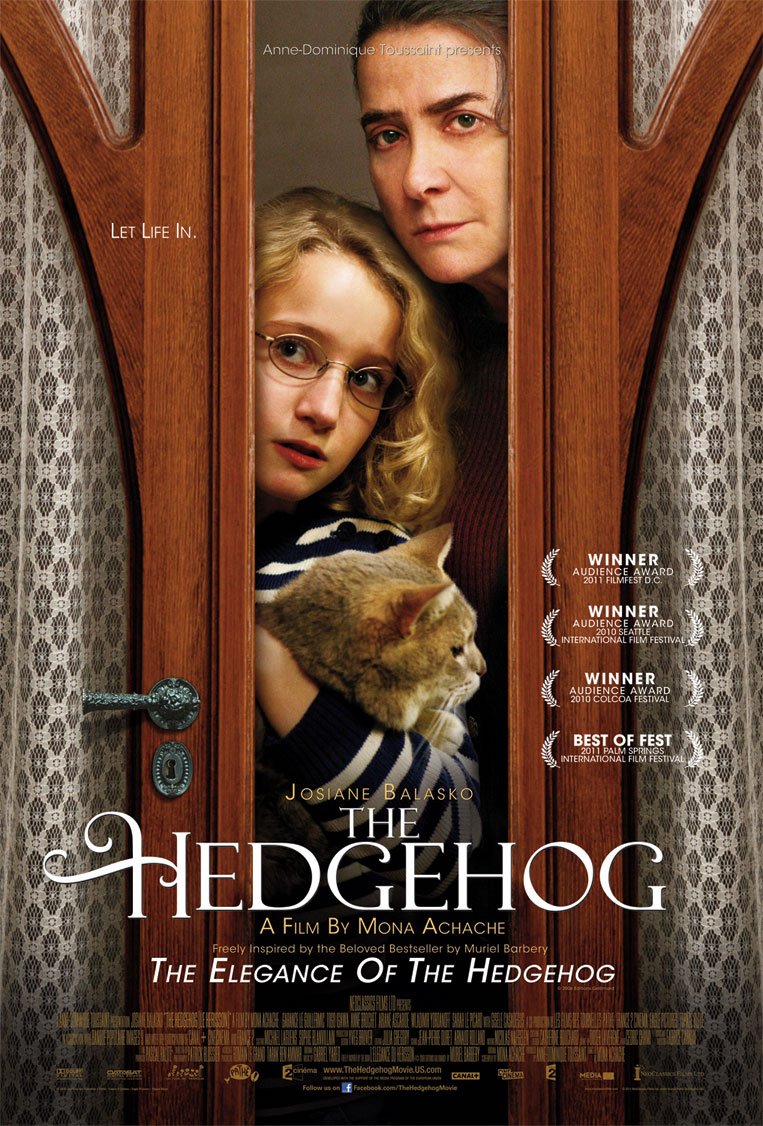The Hedgehog
- 100 Minutes. Not Rated.
“Planning to die doesn’t mean I let myself go like a rotten vegetable…”

Ozu (Togo Igawa) moves in, he befriends Renee and her prickly outside begins to falter. Kakuro takes her out to fancy restaurants, buys her some fancy clothes, and treats her like a real person. He doesn’t buy her Dolce and Gabanna either, he buys her something she’d be comfortable wearing in her favorite color. He also finds an old edition of the classic Anna Karenina, a novel that is quoted throughout the movie.
First, glancing at the movie poster you’ll think “oh what a cute family film” but one thing about foreign cinema is, they aren’t afraid to kill children and this is the basis for the 2009 French film, The Hedgehog.
Meet Paloma Josse (Garance Le Guillermic). She’s turning twelve this year and on her birthday she has decided to commit suicide. Her life isn’t bad on the outside, she is smart with rich parents and lives in a wonderful upscale apartment. She isn’t getting bullied in school or abused. She just doesn’t want to grow up and be trapped “in the fishbowl.” She begins filming the absurdity of her family to fulfill her goal of making a movie before her death. From her perspective, her mother, Solange Josse, (Anne Brochet) sees a therapist, takes anti-depressants, talks to plants, and tells the same lame stories when entertaining guests. Her sister, Colombe Josse, (Sarah Lepicard) is anxiety-ridden and trying unsuccessfully not to be her mother. Her father, Paul Josse, (Wladimir Yordanoff) seems busy,cold, and distant. They are constantly looking for Paloma as she hides from them or yelling at her to turn her camera off. She is a precocious child, an adult trapped in a child’s body. You want to yell at her and say “things get better, you go to good expensive college, disown your parents, take their money and never look back!” At least that’s what I’d do.
As the days wind down, Paloma meets the frumpy “librarian-like” superintendent of the building, Renée Michel, (Josiane Balasko) who is the main hedgehog of the story. On the outside, she is what everyone assumes her to be: a silent, distant, and frumpy lower class worker. This isn’t too far from the truth. If anyone is afraid of becoming that “cat lady,” she is the epitome. She locks herself in her small apartment reading Russian novels and hanging out with her cat, Tolstoy. She only has one friend, Manuela Lopez (Ariane Ascaride) who is employed by the Josses’ as their maid. On the outside, she is my greatest fear; to live my life alone with a pet surrounded by books. When the rich widow, Kakuro Ozu (Togo Igawa) moves in, he befriends Renee and her prickly outside begins to falter. Kakuro takes her out to fancy restaurants, buys her some fancy clothes, and treats her like a real person. He doesn’t buy her Dolce and Gabanna either, he buys her something she’d be comfortable wearing in her favorite color. He also finds an old edition of the classic Anna Karenina, a novel that is quoted throughout the movie.
This is the part of the film where I begin to think that we are going into a sweet “American” family film where everyone finds love and a reason to live… but remember this is French cinema. Right before this gets too much like Julia Roberts in Pretty Women, the story ends. I’m going to be vague about this, because the ending really makes the movie.
I have never been disappointed in French film. Irreversible, The Diving Bell and the Butterfly, In My Skin, Raw and Love Me If You Dare are in my top twenty favorite foreign films and they are all French. French film is in your face and it isn’t always pretty. Rather than American cinema’s solitary shock gore category, which is filled with gore for gore’s sake. French film tends to integrate this uncomfortableness and or gore into most of its cinema symbolically. In My Skin is about a woman who begins cutting herself as an act of preservation. This movie received a lot of attention for people actually leaving the cinema in disgust. The up close cutting scenes are gruesome, but they are important to the story. This rings true for the controversial Irreversible, which is the story of a brutal rape that begins at the end of the movie and takes us through to the beginning of the story. These both would be core curriculum if I was teaching a French film class. I will reveal this, though, because I feel like I’ve led you in this direction: this movie’s ending isn’t gory, but it is harsh.
Even though I’ve outgrown the pink hair, black clothes, and multiple piercings, I’m still a dark person and this is a splendid dark movie. Leo Tolstory wrote, “Happy families are all alike; every unhappy family is unhappy in its own way.” I’ll leave this open for discussion after the movie. Don’t watch it around Christmas time.
